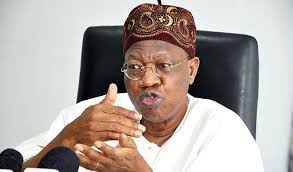The Federal Government says it has raised the fine for hate speech from N500,000 to N5 million for defaulters.
Lai Mohammed, the Minister of Information, disclosed this in Lagos on Tuesday while unveiling the reviewed Nigeria Broadcasting Code which contains the Antitrust provision aimed at boosting local content and encouraging the growth of the local industry, among other provisions.
The Minister said the Antitrust provision would boost local content and local industry due to laws prohibiting exclusive use of rights by broadcasters who intend to create monopolies and hold the entire market to themselves.
He said the Antitrust provision would also encourage open access to premium content.
According to him, the amended Code also includes the provision raising the fine for hate speech from N500,000 to N5 million.
There have been attempts by the Federal Government through the National Assembly to regulate hate speech in the country.
In 2019, the Senate reintroduced a bill that seeks to penalise persons found guilty of hate speech.
The National Commission for the Prohibition of Hate Speech Bill was sponsored by Aliyu Abdullahi, the Deputy Chief Whip.
It prescribes death penalty for anyone found guilty of spreading a falsehood that leads to the death of another person.
“I must explain that this provision is not new to Nigeria Broadcasting. Exclusivity was disallowed at a certain time in the history of our broadcasting. I recall Multichoice sub-licensing EPL matches to other local operators in Nigeria. I recall HITV engaging several local operators on sub-licensing the EPL when they got the rights,” Mohammed said.
He said the revised Code contains the law prohibiting backlog of advertising debts in order to promote sustainability for the station owners and producers of content, as well as the law on registration of Web Broadcasting, which will grant the country the opportunity to regulate negative foreign broadcasts that can harm the nation.
The amendment to the existing 6th edition of the Code, was initially launched in Kano in July 2019.
Mohammed stated that the amendments were necessitated by a Presidential directive in the wake of the 2019 general elections, for an inquiry into the regulatory role of the National Broadcasting Commission (NBC) as well as the conduct of the various broadcast stations before, during and after the elections.
Before the launch of the Code in Kano, there were wide stakeholder meetings and discussions on virtually all the provisions of the 5th edition, which was now reviewed as the 6th edition.
Mohammed explained that following the inquiry, President Muhammadu Buhari approved many recommendations that would reposition the NBC to perform its regulatory role better.
Key among the recommendations is the need to amend the provisions in the Code and Act.
He added that the amendments were mostly in the areas of political broadcasting, local content, coverage of emergencies, advertising, and anti-competitive behaviour.
The Minister also advised that Sub-licensing and Rights sharing would create opportunities for local operators to also gain traction and raise revenue for their services.
”The law prohibiting backlog of advertising debts will definitely promote sustainability for the station owners and producers of content,” he said.
”The law on registration of Web Broadcasting grants the country the opportunity to regulate negative foreign broadcasts that can harm us as a nation. Such harms could be in the area of security, protection for minors, protection of human dignity, economic fraud, privacy etc.”




